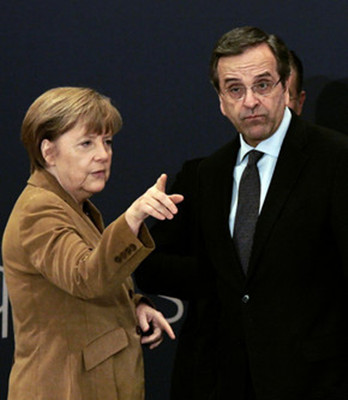德國與希臘
Go if you must
如有必要就退出
Angela Merkel appears to have become more sanguine about a Grexit
安吉拉·默克爾對“希臘退出歐元區”的態度似乎變得更加樂觀
Merkel points the way for Samaras
默克爾為希臘總理薩馬拉斯指明出路
IF THE Syriza party wins Greece's election on January 25th, most think the power to negotiate rests with Angela Merkel, the German chancellor. “A small minority, centred on the conservative leadership of the German government,” says Alexis Tsipras, Syriza's leader, “insists on rehashing old wives' tales and Grexit stories.”
如果希臘左翼聯盟在1月25日大選中獲勝����,多數人認為只有德國總理安吉拉·默克爾才能(與其)進行協商�����。左翼聯盟主席阿列克西斯·齊普拉斯表示“極力擁護德國保守派執政黨領導人的極少數黨��,堅持原來的觀點,反復提到‘希臘退出歐元區'的相關事宜?����!?/p>

So it seemed after German officials leaked to Der Spiegel, a weekly, their assessment that Grexit would not only be bearable but might even make the euro stronger. Other problem countries have weathered the crisis (Portugal, Ireland) or are making progress (Spain). The euro zone now has a bail-out fund and a banking union. German banks and insurers have reduced their exposure.
德國官員在接受德國《明鏡周刊》采訪時透露了他們的評估意見����,似乎表示:歐元不僅可以承受“希臘退出歐元區”的壓力,還可能會增強其自身實力。其他問題比較嚴重的國家有些平安度過危機(葡萄牙、愛爾蘭)���,有些不斷取得成績��,如西班牙���。歐元區目前擁有救市資金與銀行聯盟���。而德國的銀行與保險公司已降低其經營風險��。
On January 5th Steffen Seibert, Mrs Merkel's spokesman, insisted that German policy had not changed: it still aimed to hold the euro zone together. Yet all sides are now debating Grexit. Some in Mrs Merkel's Christian Democratic Union (CDU) said giving in to Greece would encourage other countries, including France, to rebel against spending cuts and supply-side reforms. Sigmar Gabriel, leader of the Social Democrats, Mrs Merkel's coalition partners, said Germany must not be “blackmailed”.
1月5日,默克爾總理發言人斯特芬·賽博特堅稱德國沒有改變政策����,仍旨在維護歐元區的統一���。然而�,德國各黨派目前就“希臘退歐”一事爭論不止�。有些來自默克爾領導的基督教民主聯盟的人士認為,對希臘做出讓步會助長包括法國在內的其他國家反對削減開支與供方改革的勢頭��。默克爾總理聯盟伙伴���、德國社會民主黨主席西格瑪爾·加布里爾表示:德國千萬不能被“要挾”�����。
Other Social Democrats recoiled from this tone. So did the CDU's conservative Bavarian sister party. “We should not behave as a schoolmaster” to the Greeks, said Horst Seehofer, the Bavarian premier. The whole discussion was “irresponsible”, warned Simone Peter, a leader of the Greens. Sahra Wagenknecht, a leader of the ex-communist Left party, which sides with Syriza, accused Mrs Merkel's government of “scare tactics” to influence the Greek election.
社會民主黨其他成員則懼怕使用這樣的語調��。基民聯盟姊妹政黨�����、巴伐利亞州的保守黨派基督教社會聯盟亦是如此�。該聯盟主席霍斯特·澤霍費爾表示,“我們不應該以校長的姿態”對待希臘人民�。綠黨領導人西莫尼·皮特警告道:整個討論都是“不負責任的”。支持左翼聯盟的前社會主義左翼黨的領導人莎拉·瓦根克內希特譴責默克爾政府采用“恐嚇手段”來影響希臘大選的行徑��。
Carsten Nickel at Teneo Intelligence, a risk consultancy, thinks Mrs Merkel is trying to “send a strong signal toAthens” that aid would still be tied to reforms, but that she will be flexible. A deal with Mr Tsipras could include lower interest or longer maturities for Greek debt. But politics limit her room for manoeuvre. One change is the rise of the new anti-euro Alternative for Germany. It did well in state elections last year but is now riven by squabbles. Any softness on Greece will feed its support in Hamburg's election in February. Public opinion remains sceptical. The tabloid Bild says that, if Greece can't play by the rules,Germany should show it the “red card”.
風險咨詢公司智庫分析師卡斯滕·尼克爾認為�,默克爾總理向雅典(希臘政府)試圖傳遞這樣一種強烈信號:援助與改革仍會綁定進行,沒有改革��,就沒有援助���,但她會靈活應對的�。與齊普拉斯主席達成的協議可能包括減少利率或延長希臘還債期限。但囿于政治上的變動,她無法施展權術。變動之一是反對歐元的德國新選項黨崛起�����。該黨在去年州選中表現優異,而如今卻因內訌四分五裂�����。對于希臘的任何仁慈行為都將有助于其支持漢堡2月份的選舉����。民眾依然持懷疑態度。德國《圖片報》畫報稱���,若希臘不按規則出牌,德國應該亮出“紅牌”�����,以示懲罰����。
This is the tightrope Mrs Merkel must walk after January 25th. Until then, she is likely to keep quiet. Even Austria, usually as strident as Germanyon the euro, has struck a note of caution. Its finance minister, Hans J?rg Schelling, told a German newspaper that it was not appropriate to “meddle in the election campaigns of other countries”. That is the last thing Mrs Merkel can be seen doing.
1月25日大選結束后,默克爾必須謹慎應對����。在這之前�����,她極有可能保持沉默���。即使是奧地利這個像德國一樣一向極力反對歐元的國家也發出了警告通知��。其財務部長漢斯·謝林在接受德國報社采訪時表示��,“任意干涉其他國家競選的行為”并不可取。默克爾總理不到萬不得已不會為之�����。翻譯:石海霞 校對:毛慧












